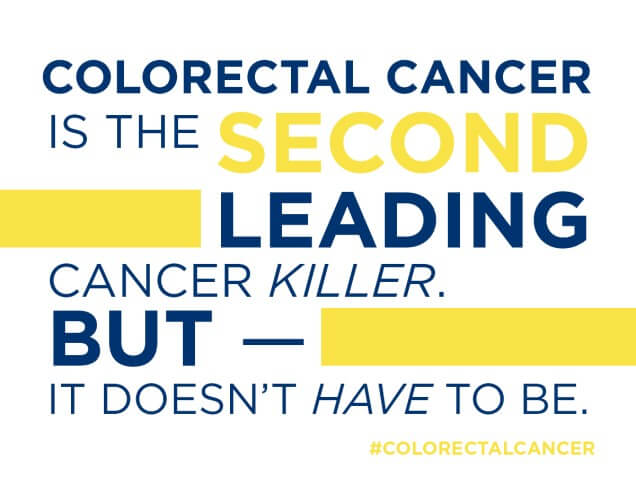New Age Guideline for Colon Cancer Screenings
- Category: Living Well, Cancer Care, Gastroenterology
- Posted On:
- Written By: Dr. Jimmy Ellis
The American Cancer Society has updated their age guideline for colon cancer screenings, recommending that people with average risk for this type of cancer should start screenings at age 45, instead of 50, the age previously recommended. The new guideline is partly based on data showing rates of colorectal cancer on the rise in young and middle-aged populations.
Colorectal cancer is the fourth most commonly occurring cancer and the second leading cause of cancer deaths in the United States, with over 56,000 people expected to die from this disease each year. However, this cancer is preventable and curable when detected and treated early.

Screening programs begin by classification of risk based on personal, family and medical history. People who are at increased risk may need earlier and more frequent screening depending upon the recommendation of their healthcare provider.
“Almost all colon cancers begin as polyps and if it is caught and removed early, it never has the chance to become cancer.” Dr. Jimmy Ellis at West Jefferson Medical Center.
Recommendations Screening People at Average Risk
- Men and women at average risk should have screening for colorectal cancer and adenomatous polyps beginning at age 45years.
- A colonoscopy (a test that allows the physician to look directly at the lining of the entire colon and rectum) every 10 years or a barium enema (x-ray of the colon) every 5 to 10 years are acceptable alternatives.
Recommendations for Screening People at Increased Risk
- People at increased risk of colorectal cancer or adenomatous polyps include those with a first-degree relative (parent, sibling or child) with colon cancer or adenomatous polyps diagnosed before 60 years
- People with two first-degree relatives who were diagnosed at any age, should have screening colonoscopy starting at age 40 years — or ten years younger than the earliest diagnosis in their family — and then repeat every five years.
- People with a first-degree relative with colon cancer or adenomatous polyp diagnosed at age greater than 60 years or two-second degree relatives with colorectal cancer should be advised to be screened as average risk persons beginning at age 40 years
- People with one second-degree relative (grandparent, aunt or uncle) or a third-degree relative (great-grandparent or cousin) with colorectal cancer should be screened as average-risk persons.
Prevention Tips
In addition to timely and regular screening for colorectal cancer, people may be able to lower their risk of getting the disease by:
- Avoiding foods that are high in fat.
- Eating plenty of vegetables, fruits, and other high-fiber foods.
- Exercising regularly and maintaining a normal body weight.
- Not smoking and drinking alcohol only in moderation.
.jpg) About Dr. Jimmy Ellis
About Dr. Jimmy Ellis
Dr. James (Jimmy) Ellis was born and raised in Old Jefferson. He graduated from St. Agnes Parochial School and Archbishop Rummel High School in Metairie, Louisiana. Dr. Ellis received his undergraduate degree in Petroleum Engineering from LSU in Baton Rouge. After graduation, he worked as a drilling engineer for five years with Exxon Mobil in New Orleans. He returned to LSU and attended medical school in New Orleans, graduating as a member of the Alpha Omega Honor Medical Society in 1991. He completed his internal medicine residency, then a fellowship in hematology and medical oncology within the LSU system. Dr. Ellis returns home to Jefferson Parish after 19 years in practice, most recently in Thibodaux, Louisiana. His greatest joys are his four daughters, who are all over the country completing their educations. Dr. Ellis is very active in many fitness activities including karate and yoga. He also loves fishing and spending time at his camp in Grand Isle.